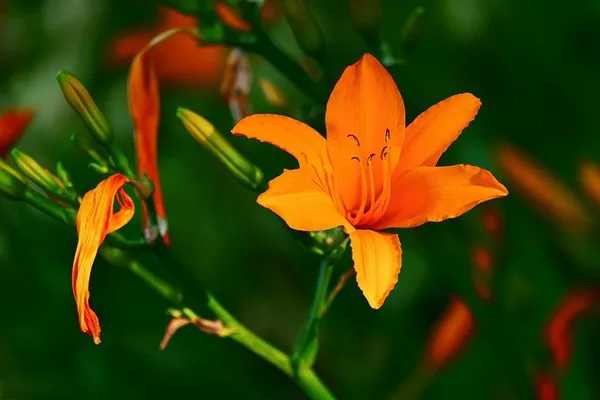In the world of flora, few flowers possess the timeless allure and profound symbolism of the lily. With its elegant, delicate petals and graceful posture, the lily has captured the hearts and minds of cultures worldwide for centuries. Beyond its aesthetic charm, the lily holds deep symbolic significance, representing a myriad of emotions, beliefs, and cultural connotations. In this article, we will explore the rich tapestry of meanings associated with the lily flower, from ancient mythologies to modern interpretations, shedding light on the enduring allure of this exquisite bloom.
Historical and Cultural Significance
The lily flower boasts a remarkable history intertwined with various cultures, each attributing its unique symbolism to this timeless bloom.
Ancient Egypt: In the ancient Egyptian civilization, lilies, particularly the white lily, held a special place as a symbol of fertility and rebirth. They were often depicted in art and used in funerary rituals to signify the hope of eternal life.
Ancient Greece and Rome: The Greeks and Romans associated the lily with their respective goddesses, Hera and Juno, both of whom represented fertility and motherhood. The lily’s regal appearance also led it to be linked with notions of purity and majesty.
Christianity: Within Christianity, the Madonna Lily (Lilium candidum) is perhaps the most recognized symbol. It represents the purity and chastity of the Virgin Mary. Legend has it that the Archangel Gabriel presented the Madonna Lily to Mary upon announcing her divine pregnancy.
Asian Cultures: In Asian cultures, the lily holds unique significance. In Chinese culture, the lily, especially the daylily, symbolizes motherhood and renewal. Meanwhile, in Japanese culture, the lily, known as the “yuri,” is associated with good luck and prosperity.
Victorian Era: During the Victorian era, the language of flowers, or “floriography,” was popular. The lily, particularly the white variety, symbolized purity and virtue. It was often used to convey sentiments of sympathy and condolences during times of mourning.
Types of Lilies and Their Symbolism
Lilies are a diverse family of flowers, and the symbolism associated with them can vary depending on the specific type. Here are some of the most well-known lily varieties and their respective meanings:
White Lily (Lilium candidum): As mentioned earlier, the white lily is often associated with purity, virtue, and the Virgin Mary. It is a common choice for weddings, representing the purity of love and the hope for a harmonious union.
Tiger Lily (Lilium lancifolium): The tiger lily, with its distinctive orange and black spots, is often seen as a symbol of wealth and prosperity. In some cultures, it is also linked to motherhood and protection.
Calla Lily (Zantedeschia aethiopica): Calla lilies are known for their elegant, trumpet-shaped blooms. They are often associated with beauty, sophistication, and marriage. Calla lilies are a popular choice in bridal bouquets.
Easter Lily (Lilium longiflorum): The Easter lily, with its pure white petals, is a symbol of resurrection and new beginnings, making it a common choice for Easter celebrations in Christian traditions.
Daylily (Hemerocallis): Daylilies symbolize renewal, as each bloom typically lasts for just one day, only to be replaced by another the next day. They are seen as a representation of the fleeting nature of life and the need to seize the moment.
Emotional Symbolism
Beyond cultural and historical connotations, lilies also carry deep emotional symbolism. Here are some of the emotions and sentiments often associated with lilies:
Sympathy and Mourning: Lilies, especially white ones, are commonly used in funeral arrangements to express sympathy and offer condolences. They serve as a reminder of the purity of the departed soul.
Love and Devotion: Lilies, particularly red and pink varieties, are associated with love and romantic devotion. They can be given as a gesture of deep affection and passion.
Rebirth and Transformation: The lily’s connection to spring and its vibrant blooms emerging from the earth symbolize renewal and transformation. It reminds us that even in the darkest of times, there is hope for a fresh start.
Motherhood and Family: Lilies, especially the daylily and tiger lily, represent motherhood and the nurturing qualities of parents. They are often given as gifts to celebrate the birth of a child or to honor a mother’s love.
Modern Interpretations
In today’s world, the symbolism of the lily continues to evolve and adapt to contemporary contexts. While the traditional meanings endure, modern interpretations have also emerged:
Elegance and Sophistication: Lilies are often associated with elegance and sophistication. Their graceful appearance makes them a popular choice for formal events and upscale floral arrangements.
Hope and Optimism: Lilies are seen as a symbol of hope, reminding us that even in challenging times, there is the potential for growth, renewal, and brighter days ahead.
Environmental Awareness: As a result of growing environmental concerns, lilies have taken on new symbolism related to conservation and the preservation of natural beauty. They are a reminder of the importance of protecting our planet and its fragile ecosystems.
Conclusion
The lily flower, with its rich history and diverse cultural symbolism, continues to enchant and inspire people worldwide. Whether as a representation of purity and motherhood, a token of love and devotion, or a symbol of hope and renewal, the lily’s enduring appeal lies in its ability to convey a multitude of emotions and ideas. As we gaze upon the elegant petals of this remarkable bloom, we are reminded of the timeless beauty and profound symbolism that make the lily a cherished and revered flower in our global floral tapestry.


